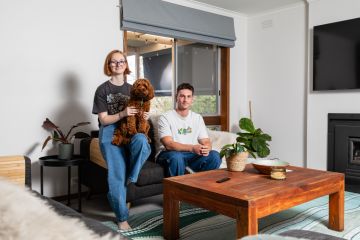Five things to know about strata living before you buy

Two years ago, my husband and I were crazy brave enough buy a home together – my first property purchase, his second.
I love the apartment: it has a whole wall of built-in bookshelves, and there are cherubs on the plaster ceilings. It may or may not be paid off in our lifetimes.
While I’m ridiculously grateful to be off the rental treadmill and don’t for a moment regret the purchase, there are a few things I wish I’d known before we began the process.
Simultaneous settlement can do your head in
When we started house hunting in Sydney, we expected it would take forever to find somewhere we both liked (and could afford). So it came as a surprise when we were the highest bidders at the first auction we attended.
That meant we had to put the old place on the market pronto, cross our fingers for a decent price and try to arrange the sale and purchase on the same day to avoid bridging finance.
In our case, the risk paid off but it could have gone pear-shaped very easily.
Settlement day was a nightmarish blur of paperwork, lawyers, real estate agents, couriers and terminally incompetent removalists.
In hindsight, it probably would have been more prudent to sell first. Then again, that might have meant moving into a rental property and watching from the sidelines as the market continued to skyrocket.
Arranging finance is kind of a big deal
A sensible buyer would have had their finances in order before bidding at auction. We were more fly-by-the-seat-of-your-pants types. While we had visited a mortgage broker and knew how much a bank might lend us, we didn’t have our finance pre-approved and were fairly ignorant of such exotic concepts as loan-to-value ratios.
There is, I now know, a difference between a bank valuation and a market valuation. In other words, we didn’t think we had paid too much but the bank thought otherwise, which meant we had to bend over backwards to provide security for the loan.
It turns out the fine print is kind of important.
Don’t be afraid to be nosy
After we moved in, one of my new neighbours told me she had deliberately hung children’s clothes on the line during an inspection as a hint to prospective buyers that children lived in the building.
The usual paraphernalia of childhood – the bikes, the badminton rackets, the footballs – had been neatly hidden away, and she didn’t want people thinking they were about to buy a quiet residence.
Happily, we already had one child and since moving in, we’ve made another. It was a reminder, though, that it pays to be nosy by finding out as much as you can about the day-to-day aspects of living somewhere – things like parking, security, public transport, schools, nightlife and any problems with neighbours.
Read the contract (really, really) closely
There are still two bare light bulbs in my home because the previous owners took all the light fittings with them – as stipulated in the contract, I discovered after we moved in. I will get around to buying new ones, but that might have to wait until after the next strata levy (see below).
There were a few items we overlooked or mistakenly assumed would be included with the sale, such as the built-in shelving in the sunroom. Don’t just rely on vague statements by the agent (“Sure, I don’t see why it wouldn’t be included”). If it’s not in the contract, find out why not.
Strata living is full of nasty surprises
In deciding how much we could afford to borrow, we had factored in predictable expenses, such as stamp duty, legal fees, rates, levies and, you know, food and stuff.
What we didn’t take into account was the possibility we would be bludgeoned further into the red courtesy of a special levy to fix a retaining wall.
A strata inspection before the auction revealed the wall was crumbling, but a special levy had already been raised to cover quoted cost of repairs. The work began after settlement and went not only over time but eye-poppingly over budget, leaving us with a huge bill for something we thought had been paid for.
How could the situation have been avoided? It’s hard to tell. Maybe we should have drilled down further into the builder’s quote, commissioned our own report or questioned the neighbours about their knowledge of the proposed works. In the end, we had to suck it up. And discover new ways with mince.
If there is a next time, I’ll be better prepared.
We recommend
We thought you might like
States
Capital Cities
Capital Cities - Rentals
Popular Areas
Allhomes
More







